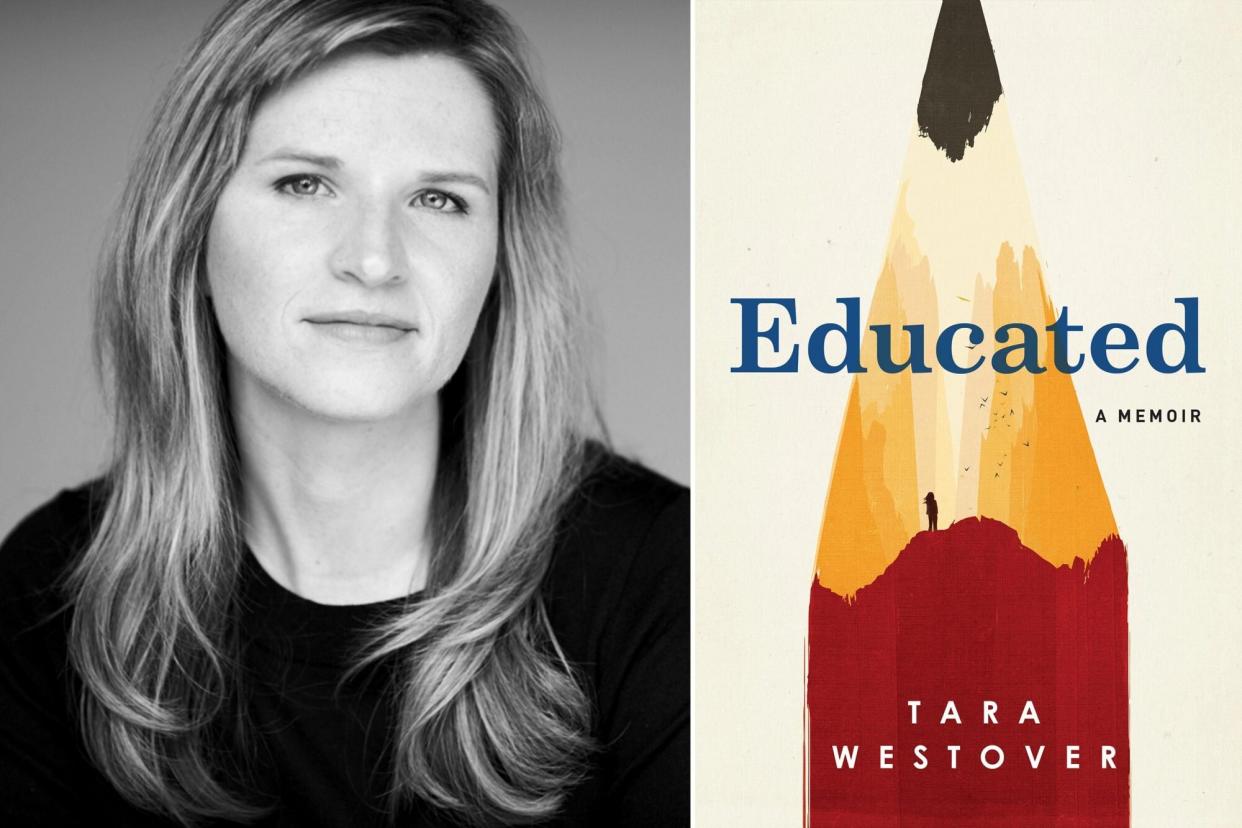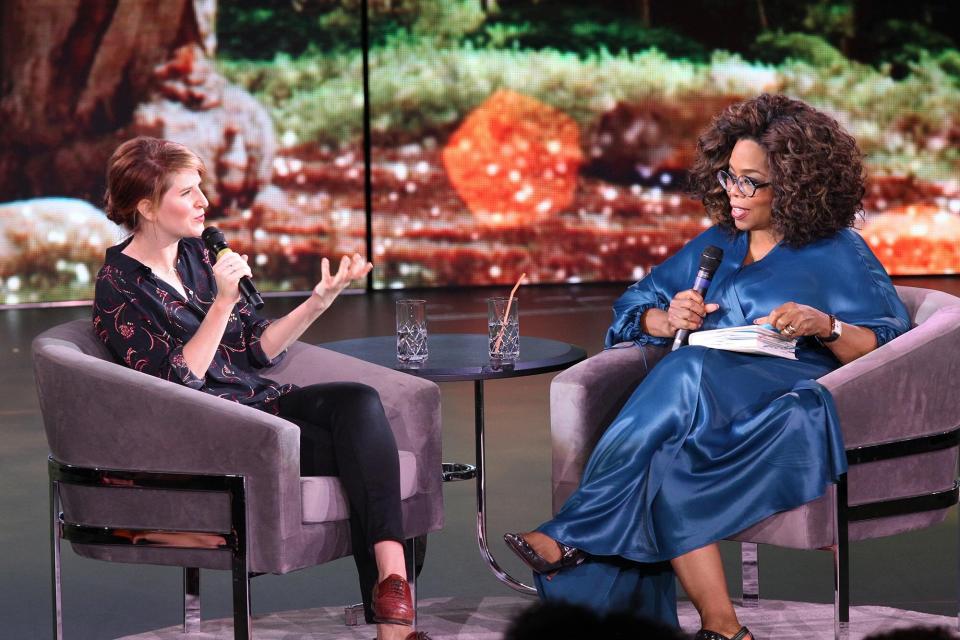Tara Westover's Educated has sold 4 million copies. She's ready to get her life back

- Oops!Something went wrong.Please try again later.
Paul Stuart; Random House Tara Westover / Educated
The story Tara Westover tells in her memoir Educated is remarkable in and of itself; a story of overcoming, to most readers, inconceivable odds before going on to triumphant personal success. And now the journey on which the book has gone, in just over two years, appears no less astonishing. One woman's story, sensitively and lyrically told, has gone on to sell 4 million copies and emerge as a rare memoir blockbuster, at the level of Wild and The Glass Castle.
It just crossed two years on the New York Times best-seller list; it hit no. 1 in its 100th week, a space it's long been familiar with. The book was nominated for the Carnegie Medal for Excellence and the LA Times Book Prize; it won Audible and the Audies' top awards for recorded memoir. Barack Obama named it one of his favorite books of the year; Oprah Winfrey and Ellen DeGeneres have touted it on their national platforms, too. Westover was also named one of the 100 most influential people by Time Magazine, with Bill Gates writing her entry—especially poignant since Westover, who grew up in dangerous conditions with survivalist parents, ultimately earned a PhD at Cambridge University on the support of a Gates Scholarship.
How to square all this? If you're Westover, you don't, really—you keep on keeping on. EW caught up with the author to celebrate the two-year milestone, and in conversation, she came off alternately humbled and bewildered, determined to keep looking ahead and find ways to make meaningful change. When I asked her about her role as a public figure (she speaks around the country and has sold, you know, millions of books), she flatly denied the label. And when I wondered what all the success has meant to her, she wound her answer toward the life she's eager to get back to. And yes, she's eager to write some more, too. Just maybe not a memoir.
Below is an edited transcript of our conversation.
ENTERTAINMENT WEEKLY: How would you sum up the past two years?
TARA WESTOVER: How would I sum up the past two years? I mean, it's been exciting. It's been surprising, bordering on shocking. It's been overwhelming. I was obviously really shocked by how well the book did. You live your own little life and it feels like it would be interesting to you and, if you're lucky, the people immediately around you. When I started to write about it, I thought, "Oh, maybe it will be for the people who have struggled with certain kinds of difficult families or extreme ideologies or things like that. I really didn't expect that it would be something that a lot of people en masse would identify with or want to read. I'm grateful so many people have taken time out of their own lives to spend it on mine.
Has there been a personal highlight for you on this journey so far?
Every single one of them felt like a personal highlight. It was a really personal connection for me when Bill Gates happened to read the book because he was the one who funded my time at Cambridge. He actually read the book, he told me, without knowing that I had gone to Cambridge on a Gates Scholarship, and Melinda didn't either. He walked by her reading it and said, "Oh, there's a surprise coming later in the book," and they had no idea. That was special for me because I benefited from their generosity. Same thing with Obama: It never would have occurred to me that President Obama would read it, that a former president would read it and support it. It's still surreal. I still don't fully get it. I'm grateful, but I don't fully get it.

George Burns/Harpo, Inc Oprah Winfrey Super Soul Sunday with Tara Westover.
What do you think it is about the book that has resonated, though? It continues to sell very well to this day.
What I think of as the two big themes of the book are family and education. A lot of people, maybe they don't have family situations that are quite as dramatic as mine, but a lot of people are trying to answer that basic question about what are the obligations they have to their families, and what do they owe themselves, and what do they do when those two things are in conflict or in tension? How do they solve that? A lot of people are dealing with some version of that, even if it's not my version. I think stories are part of how people work out how they feel about their own lives. I think that's the point of stories, that we read what other people did and that we can identify that, and that we use that to work out what we think about our own decisions that we made. The education side of it, for me, I think of being closely related [to family]. The fact that I was able to gain access and different points-of-view and study to learn things was what changed me as a person. That had a big impact on the relationship I had with my family, it was really defining in terms of the choices I would make and how I would resolve that tension. I wonder if there are people in general where you grow up one way, and the world looks one way when you're a child, and as you grow up, you have to hold in balance that tension between who you were and who you're trying to be. Who your family thinks you are and who they want you to be. Maybe there's a whole lot of people who have to struggle with that question. I learned things, and those things that I learned changed me. What does that mean?
Given stuff like the Time 100, which is really a statement of you being an influential person, how do you see your role as a public figure, two years out from the book's publication? Your story is one so many have been drawn to.
I don't think of myself as a public figure. The only times that I think about it really, in any serious way, are when I think about the political polarization, the general situation that we have in the country right now where there's such a clash of culture and ideology. Really a loss of goodwill between people who live where I live now—I live in New York—and people who live where I grew up in Idaho. There seems to be a real lack of understanding. There's just not a lot of crossover. There aren't a lot of people from those two worlds who are coming together. There's not a lot of interaction, there's not a lot of understanding, there's a breakdown of empathy. And there's not too many people who've lived a little bit in both places. I want those people to write more. So I suppose I should do that. [Laughs]
In that, I'm curious about your identity as a writer at this point.
Anything I write about will have to be a little bit different. Maybe I'll write personal essays or journalistic essays or a novel, I don't really know what the format will be in the future. That's kind of what's fun about writing, every project can be a little bit different. I don't know what the next thing is yet. But it'll have to be different. That will be good, because it won't be about me, I really hope. [Laughs] Mostly, I think what's missing right now is good stories about people living different lives. We have a tendency to see each other entirely through the political lens. As much as we're interested in people from Idaho, we're only interested in them to try to understand why they vote differently than we think they should. I happen to think you'll never understand why somebody votes differently than you think they should if the only thing you care about is why they voted the way they did. If you want to understand that one decision, you have to understand a whole lot of other things, and you have to be interested in people as an end in themselves. Then you have a very good chance of understanding why we disagree. That's why I think good stories are really needed. We need to have stories about people where the whole point is trying to understand people on their own terms.
You're about to hit two years on the New York Times best-seller list, which is pretty remarkable. We've talked a lot about what this means, and why, and how you're moving forward. But what has this meant to you, personally? How have you processed it all?
I wish I could answer that question. I've been saying it for about a year now: "It's too soon! I don't really know! Check in with me later!" It's all still really recent. Now I'm listening to you and I'm realizing, "No, it's been two years. That's a long time. How long do you need to process this?" I think a little bit longer. [Laughs] I don't know why. I'm grateful, I'm shocked, I'm delighted. Where I'm at right now is trying to say, okay, here's the book that for the last two years has kind of dominated my life. Now I'm going to try to get my life back from the book; let the book keep doing its thing, but I'm going to go try to get a little bit of my life back the way it was. What kind of books did I read before people used to ask me to read specific books? Where did I like to travel before I spent all this time traveling to places the book is going? I've had two years where my whole life has been about the book. What I'm trying to do now is make my life a little bit about my life. There hasn't been a whole lot of life outside of the book. I need to minimize it down to, you know, something that happened.
Related content:

